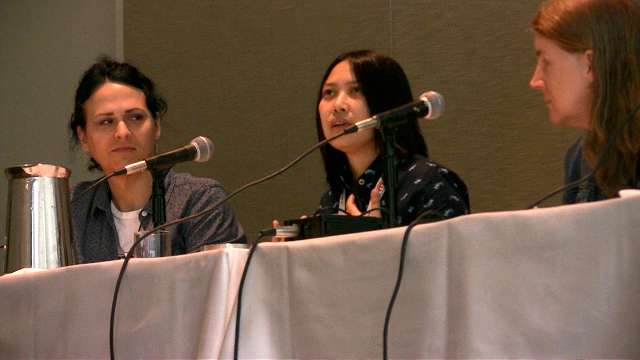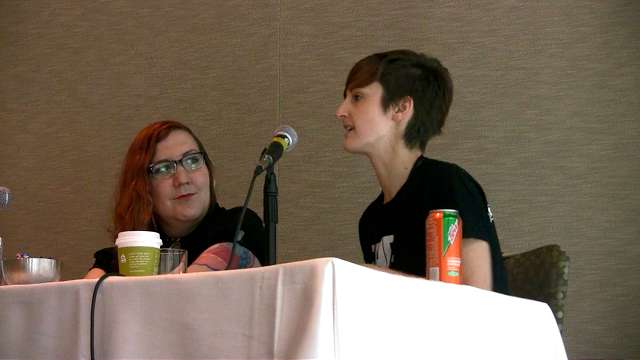"In a video game, you pick your gender, and everybody uses the right pronouns." – Josie Doggett
This past weekend, the GaymerX convention allowed members and allies of the LGBTQ community to come together to discuss video games, their sexualities and identities, and how they all intersect. Creating Character: Exploring Queer Identity, a panel which drilled gender down further than gay/straight binaries, explored what gaming is like for transgender and bisexual players as well.
The members included Emilia Schatz, game designer for Naughty Dog (Uncharted 3, Uncharted 4); Regina Buenaobra, the North American Community team lead for ArenaNet (Guild Wars 2); Josie Doggett, visual effects artist for Harmonix and formerly of 38 Studios; Heather Cerlan, texture artist for Naughty Dog (The Last of Us and Left Behind DLC); and Carolyn Petit, an editor for Gamespot whose most recently (in)famous for the glowing review she gave Grand Theft Auto V. (Seriously, it was a 9 out of 10.)
Carolyn, who acted as moderator for the panel, addressed her own claim to fame by saying, “The idea of objective reviews… is kind of silly.” She went on to explain that our experiences inform the work that we produce. Thus, being a trans-woman should affect how she reviews and rates a particular game or why she would want to write about women’s issues in gaming. In fact, when she does, they often witness significant backlash from the Gamespot community, suggesting that there are too many articles with a feminist agenda. However, just like it is for this site, social issues are far and away the minority of what Gamespot produces in content.
Playing games in general, she said, also puts her in the position of having to identify with “violent white men” in games the majority of the time. When she or other writers try to challenge that default character, commenters claim they are pushing an agenda. To this, Carolyn amazingly replies, “99% of media… crams normalcy of heteronormativity down our throats.” But she feels that over time, these notions can be broken down.
Josie, on the other hand, said that the agro part of her wants to say, “Damn right!” when being accused of shoving an agenda down someone’s throat. (When it comes to LGBTQ issues, BioWare's David Gaider said on other panels how inadvertently hilarious this kind of statement is.) She said that issues that transgender people have to deal with are very often a life and death matter, and it’s worth the accusation to gain some recognition. In terms of forwarding game design, she said she’d like to see games that restrict the agency of players and force them to explore new identities, such as those of queer and trans people.
Of course, in the case of the Left Behind DLC for The Last of Us, players are indeed forced to play as a young adult lesbian, Ellie. To be precise, players controlled her during the Winter chapter of the main game, but the trait was made explicit during the DLC. Heather Cerlan stated that being openly gay in the video game industry opened up the opportunity to discuss Ellie’s character with Neil Druckmann, the creative director at Naughty Dog. He was not only open to it, but he brought in other women in the company to make sure they got the experience right. “He said, ‘If you’re going to write Ellie in as a gay character… don’t shy away from it.’”
In response to the story told during Left Behind, a young woman wrote a letter to Naughty Dog thanking them for creating Ellie. She was in the closet herself and what they created gave her the confidence to come out as a lesbian. Heather was so touched by the letter that she reached out personally from her own email address and since then they’ve become pen pals of sorts, which is exemplary of the ways stories can touch us and bring us together.
Emilia also praised the welcoming work environment at Naughty Dog, which really enabled her to transition earlier this year. She described her experience or talking over the transition with HR and finally sending an email on a Friday to the whole company letting them know it’d be her last day presenting as a male. The following Monday, so nervous about how her coworkers would take it, she brought in cookies her wife made and handed them out to everyone, but they were mostly happy to have a cookie as opposed to uncomfortable about her appearance. This anecdote may shy away from games specifically, but it’s important to note that despite the lack of LGBTQ representation in games, there are companies in the industry that embrace their diverse staffs behind the scenes.

Discussing the impact games have had on her, she brought up Mass Effect, which allowed her to play as a female in an engaging story. Initially, she played as a male paragon, planning to do a female renegade run afterwards, but she said that once she put on FemShep’s shoes, she still played as paragon. She felt more compelled to play a woman as she is than just to try out the renegade route. Emilia remarked that unlike passive mediums, you’re not a spectator in video games and you can truly become a character for a small bit of time. “It creates a seed of empathy,” which is something games have that many people outside of gaming don’t understand.
Still, sometimes fans are successful in getting LGBTQ content into games, as in the case of Guild Wars 2. The characters, Marjory Delaqua and Kasmeer Meade, are in a lesbian relationship but they weren’t originally envisioned as queer. Instead, fans started taking note of tension between them and wrote fan fiction or speculation, something ArenaNet took notice of. Regina said that when the writers wanted to push them in that direction, she was consulted regarding the dialogue, which she never expected as the community manager.
“It’s rare to see someone like me,” she said, remarking that Marjory also appears to be of Asian descent as Regina is. And it’s true that queer Asian ladies are infrequent in games, with the only example I can recall being in Jade Empire, which took place in an East Asian-inspired fantasy land. She said that although fans inspired this transition for the two characters and there are other queer characters in that universe, they experienced some backlash when the relationship went “from subtext to main text.” Regardless, she says, “Even if you include this little bit of content, it means so much [to the LGTBQ players].”
In the end, all the panelists said they will continue to push for more diversity and that failure to be inclusive should always be questioned. For many of us players, games are an escape, and they allow us to assume identities that we don’t otherwise get to live out in real life. And as Carolyn put it, “AAA can tell other stories, too.”







